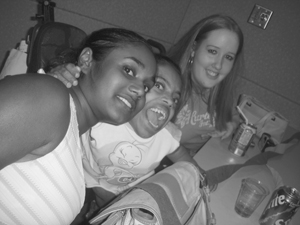Chapter Eleven
Develop a support network. Look to family, friends, and teachers.
Call it a clan, call it a network, call it a tribe, call it a family. Whatever you call it, whoever you are, you need one.
— Jane Howard —

Successful adults with disabilities report that they benefited in their youth from opportunities for inclusion, high expectations from adults, disability-related accommodations that de-emphasized their differences, promotion of autonomy, encouragement of friendships, and support from caring adults. On the other hand, their progress was inhibited by segregation, atypical treatment that highlighted their differences, restricted opportunities for independence, social isolation, and social rejection (Powers, Singer, & Todis, 1996).
Environmental factors have a major impact on the development of self-determination skills in young people with disabilities. Relationships with people and activities in which they are engaged can serve to support or obstruct their movement toward self-determination. For example, a parent who provides a son with opportunities to make choices, no matter how limited, is supporting the development of self-determination skills in that child. In contrast, a parent who overprotects her daughter is obstructing her development of self-determination skills. Of all the environmental supports in a young person's life, relationships with others can present the greatest barrier to self-determination (Field & Hoffman, 1994a, b). As reported by an accomplished scientist who is blind:
Some adults helped me a lot, but more of them caused barriers to my development. Some of that is so terrible it won't make it into anyone's book. Everyone steered me away from science.
Without supportive relationships, some people with disabilities, like the person quoted above, still manage to achieve self-determined, successful lives. However, too many simply learn to let others make decisions for them. "Learned helplessness" is passive behavior that can result from overprotection, from an environment where a child has few opportunities to make choices, and from a child's repeated failed attempts to control her life. Eventually, she avoids new challenges and accepts a life controlled by others.
Adults can help young people lead self-determined lives by being sensitive to the language they use, promoting positive relationships with adults, encouraging friendships, promoting participation in healthy activities, and giving young people choices.
Participating in clubs, organizations, and sports can contribute to a successful life. Adults can help young people with disabilities get involved. These efforts will pay off in helping them find happiness for themselves and contribute in a positive way to the lives of others. People who are content with their lives are usually involved in volunteer activities; enjoy helping others; have a tendency to protect siblings, friends, or pets; and care about the plight of other people (Katz, 1997).

Positive relationships and participation in activities contribute to a successful, happy life. After young people have completed the online activities in this chapter, they will know the value of:
- positive relationships with adults
- engagement in social activities
- positive peer relationships
- participation in clubs, organizations, sports, and other activities
- opportunities to contribute
- opportunities to make choices
- negotiation, compromise, and win-win decisions
- opportunities to verbalize plans and practice self-determination steps
The e-mentoring administrator can select appropriate messages from the following examples and send the Mentor Tip messages to the mentors only and the E-Community Activity messages to the entire mentoring community. Use these examples to stimulate other ideas for online discussions. It is desirable that, ultimately, most discussion topics come from the mentors and protégés.